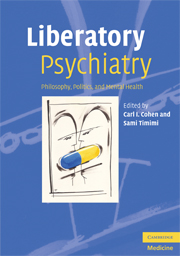Book contents
- Frontmatter
- Contents
- Contributors
- Acknowledgments
- Introduction
- 1 Working towards a liberatory psychiatry? Radicalizing the science of human psychology and behavior
- 2 Power, freedom, and mental health: a postpsychiatry perspective
- 3 Challenging risk: a critique of defensive practice
- 4 Democracy in psychiatry: or why psychiatry needs a new constitution
- 5 German critical psychology as emancipatory psychology
- 6 Psychopolitical validity in the helping professions: applications to research, interventions, case conceptualization, and therapy
- 7 Class exploitation and psychiatric disorders: from status syndrome to capitalist syndrome
- 8 Ecological, individual, ecological? Moving public health psychiatry into a new era
- 9 Children's mental health and the global market: an ecological analysis
- 10 Postcolonial psychiatry: the Empire strikes back? Or, the untapped promise of multiculturalism
- 11 A new psychiatry for a new world: postcolonialism, postmodernism, and the integration of premodern thought into psychiatry
- 12 Neoliberalism and biopsychiatry: a marriage of convenience
- 13 Psychoanalysis and social change: the Latin American experience
- 14 A new psychiatry?
- Index
- References
13 - Psychoanalysis and social change: the Latin American experience
Published online by Cambridge University Press: 25 August 2009
- Frontmatter
- Contents
- Contributors
- Acknowledgments
- Introduction
- 1 Working towards a liberatory psychiatry? Radicalizing the science of human psychology and behavior
- 2 Power, freedom, and mental health: a postpsychiatry perspective
- 3 Challenging risk: a critique of defensive practice
- 4 Democracy in psychiatry: or why psychiatry needs a new constitution
- 5 German critical psychology as emancipatory psychology
- 6 Psychopolitical validity in the helping professions: applications to research, interventions, case conceptualization, and therapy
- 7 Class exploitation and psychiatric disorders: from status syndrome to capitalist syndrome
- 8 Ecological, individual, ecological? Moving public health psychiatry into a new era
- 9 Children's mental health and the global market: an ecological analysis
- 10 Postcolonial psychiatry: the Empire strikes back? Or, the untapped promise of multiculturalism
- 11 A new psychiatry for a new world: postcolonialism, postmodernism, and the integration of premodern thought into psychiatry
- 12 Neoliberalism and biopsychiatry: a marriage of convenience
- 13 Psychoanalysis and social change: the Latin American experience
- 14 A new psychiatry?
- Index
- References
Summary
Introduction: Freud, Marx and progressive psychoanalytic theory
Throughout the twentieth century, Leftist psychoanalysts and psychoanalytically inclined Marxists have tried to achieve some sort of a synthesis between psychoanalysis and Marxism. Thus, through the years the confusing term of “Freudo-Marxism” has popped up periodically. The reality is that no authors ever recognized themselves as a participant in a Freudo-Marxist current. As Alejandro Vainer put it, “Freudo-Marxism never existed.”
In Latin America, when someone is accused of being a Freudo-Marxist, he or she is seen as somebody who is theoretically sloppy; who establishes a cross of little theoretical and clinical consistency between Marxism and psychoanalysis. Supposedly, in that mélange, patients get poorly psychoanalyzed and badly politicized. From that point of view, a Freudo-Marxist is somebody that you would not want to introduce as your associate to your colleagues in the intellectual and scientific fields. Freudo-Marxist is a name that was utilized to disqualify Marxist psychoanalysts.
Leon Rozitchner is a philosopher who has contributed brilliant insights to the problem of articulating psychoanalysis and Marxism. In his classic work, Freud and the Problem of Power, Rozitchner analyzes the internalization of power in the formation of subjectivity according to Freud and Marx:
When Freud finds that the fortress with which Power contains us is not outside, but imprisoning us from inside ourselves, installed in the domain so called “interior”, organizing with its apparatus of domination, our own psychic apparatus, is he not showing us the ways for an analysis of the problem of domination and an analysis of Power that necessarily has to involve the subject as a locus where this resides and debates with itself? […]
- Type
- Chapter
- Information
- Liberatory PsychiatryPhilosophy, Politics and Mental Health, pp. 257 - 274Publisher: Cambridge University PressPrint publication year: 2008



